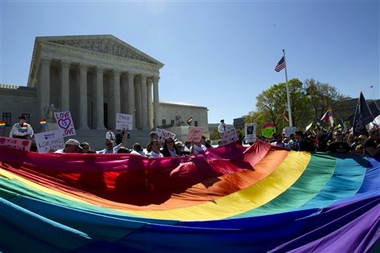Couples, officials, foes readying for gay marriage ruling

Staff writer
With a U.S. Supreme Court ruling on same-sex marriage expected any day now, gay couples in states with bans are making wedding plans, courthouse officials are getting ready for different scenarios and steadfast foes are working on their strategies to keep up the opposition.
Marriage license bureaus are bracing for a rush of applicants if the court overturns bans. Meanwhile, there’s been a series of planning sessions by groups that intend to explore religious objection responses to protect “traditional marriage” limited to heterosexuals.
Gay couples, such as Ethan Fletcher and Andrew Hickam of Cincinnati, are gearing up for a quick run to the courthouse in Ohio, Michigan, Kentucky and Tennessee — the states involved in the cases that were argued in April before the justices. They’re among 14 states that ban same-sex marriage, and if the high court rules in favor of gay marriage, it would apply nationally.
Fletcher, 31, a University of Cincinnati senior academic adviser, and Hickam, 30, a GE Aviation engineer, have arranged to take off work to get their license if the decision allows immediate same-sex marriages and will then plan a formal wedding. They became engaged nearly two years ago but decided against getting married in another state as long as there was the possibility they could do it at home.
“Well, we live here and we pay taxes here and our families live here,” said Fletcher, adding that they want his grandmother and Hickam’s mother to be able to attend. “We didn’t feel that it was reasonable for us to have to travel out of state for the freedom to marry.”
In Hamilton County, where Cincinnati is located, the marriage license bureau said other courthouse staffers have been cross-trained and forms are available online to help speed the process. Court officials in Cuyahoga County, where Cleveland is located, say they’re prepared to process triple the usual number of applications.
Probate Court Judge Jan Michael Long, of Pickaway County, near Columbus, said he and other probate judges met to discuss potential rulings and their impacts. There are a lot of procedural issues involving the need for gender-neutral wording and who gets legal notifications, he said, and it could be complicated depending on when the court ruling becomes effective and how it’s worded.
In Ingham County, Michigan, Clerk Barb Byrum said she might not wait for a new marriage license form from the state, and could simply white-out “bride” and “groom” on the application when she gets the legal green light.
She has collected dozens of email addresses from local same-sex couples to notify them of the Supreme Court decision when she knows it. She was among four clerks who issued licenses on a Saturday during a 24-hour period in 2014 when gay marriage in Michigan was legal between court orders.
The Tennessee Equality Project has been asking people to let them know in advance if they plan to get married on Day One. Its website includes instructions on obtaining licenses and finding officiants. Bleu Copas, who lives just outside of Knoxville, said he wants to get married right away if the ban is lifted.
“We’re looking at wedding bands and what to wear,” he said.
He and his fiance plan to marry at a small chapel on a farm belonging to the pastor of Nashville’s Covenant of the Cross Church, Greg Bullard, who intends to host at least 15 free weddings for same-sex couples on July 3 if the court makes it legal. Some pastors, though, have signaled plans to resist a Supreme Court ruling in favor of same-sex marriage. Texas Republican Gov. Greg Abbott recently signed a “pastor protection” law that allows clergy members to refuse officiating marriages that violates his religious beliefs.
Leaders of the Southern Baptist Convention, meeting Wednesday in Columbus, issued a statement saying they would not recognize, host or perform same-sex marriages. Some county clerks in Kentucky and other states, including Nebraska, have expressed objections to the possibility of same-sex marriages, but Douglas County Clerk Thomas Cavanaugh, in Omaha, said Nebraska’s largest counties already have changed marriage license applications to include gender-neutral wording and are ready to follow whatever the high court decides is the law.
North Carolina and Utah have passed laws allowing some court officials to refuse to perform gay marriage responsibilities.
Advocacy groups opposed to same-sex marriage have been discussing the legal defenses for religious objectors including business owners, employers and others besides clergy and court officials. Phil Burress, leader of the Citizens for Community Values that opposes gay marriage, predicts a ruling in favor of it will trigger more litigation and political action.
In Cincinnati, Hickam and Fletcher say if the court upholds bans, they’ll go to a state that has recognized same-sex marriage through state, not federal action, to wed and then work for the political movement to gain recognition at the ballot box.
“We would then just join forces with the rest of the gay community to bring about change through the democratic process,” Hickam said. “And things would be hopeful going that route.”
Copyright 2015 claremoreprogress.com
Source: The Claremore Daily Progress, Claremore, OK via AP wire





